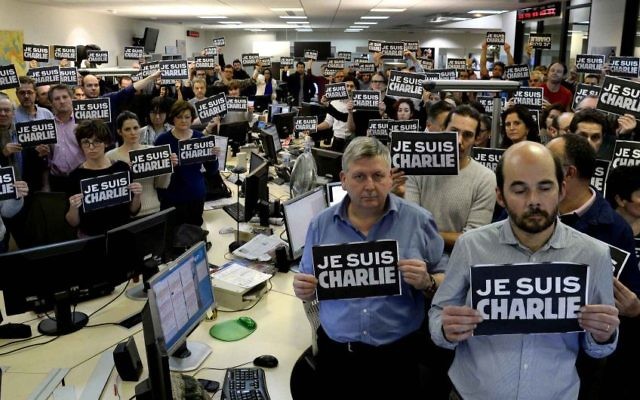Our View: Je Suis Charlie
We have reached the anniversary of the terrorist attacks that briefly united France beneath a forest of “Je Suis Charlie” (I am Charlie) and “Je Suis Juif” (I am a Jew) signs.
On Jan. 7, 2015, two gunmen charged into the offices of the satirical, anti-religion magazine Charlie Hebdo and slaughtered 11 people, then executed a police officer during their getaway. By the time they and a third Islamist terrorist were stopped two days later, another police officer had been killed in the streets of Paris, and four Jews had been slain during pre-Shabbat shopping at a kosher supermarket.
 Between 3 million and 4 million people marched in France on Jan. 11, as did thousands in Atlanta, against the violence and hatred and in support of the French principles of liberty, equality and fraternity.
Between 3 million and 4 million people marched in France on Jan. 11, as did thousands in Atlanta, against the violence and hatred and in support of the French principles of liberty, equality and fraternity.
Prime Minister Manuel Valls typified French defiance, declaring that France would not be France without its Jews.
Alas, the past 12 months have proved that the beautiful moment of unity was fleeting.
If Valls was right, France is significantly less French today: More than 7,900 French Jews made aliyah in 2015, according to the Jewish Agency for Israel.
It was the second consecutive year that France was the top source of immigrants to Israel, and while Israel was strengthened and served its essential function as a haven for so many French, as well as 7,300 Ukrainians and 6,800 Russians among a total of nearly 31,000 olim (immigrants), it was a sad commentary on the decaying situation for Jews in France.
Still, the increase from 2014’s 7,200 olim from France was far less dramatic than predictions immediately after the January attacks of at least 10,000 making aliyah. If only all of French society showed as much backbone and constancy as those Jews who refused to be driven from their homes.
Instead, as the documentary “Je Suis Charlie” shows, French media and Christian leaders began turning on Charlie Hebdo within weeks, and the idea persists that the magazine was asking for it through repeated lampooning of Islamic extremism and occasional depictions of Muhammad. (The AJT is sponsoring two screenings of “Je Suis Charlie,” followed by panel discussions, at the Atlanta Jewish Film Festival on Feb. 4 and 5.)
Sure enough, Charlie Hebdo is being criticized for its issue marking the anniversary of the slaughter. The cover depicts a blood-spattered G-d with an AK-47 beneath a headline meaning “One year after, the killer is still on the run.”
It’s an offensive, outrageous statement blaming organized religion and warring faiths for the violence. And it’s exactly the kind of thing Charlie Hebdo did before Jan. 7, 2015, and should keep doing in defiance of terrorists and of those who think freedom of speech is secondary to an imagined freedom not to be offended.
Remember that in liberte, egalite, fraternite, liberty comes first, and nothing is more essential to liberty than the freedom of speech, the freedom of the press and the freedom of (or from) religion. Thus, we’re proud that Yonathan Arfi, the vice president of CRIF, the umbrella group for France’s Jewish communities, told The Wall Street Journal: “It’s natural that Charlie Hebdo decided to not retreat. If they had, the terrorists would be seen as the winners.”
Intolerance and outrage about a harmless cartoon — G-d, after all, can defend Himself — are the hallmarks of al-Qaida and Islamic State. We who value a free society must have thicker skins.




comments